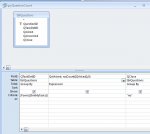I am having a small problem with null. I have a form that allows me to add questions to each selected record if I would like to. Not every record will have questions related to it. I am also showing in a text box the count of questions for each record.
Everything is working just fine except, I would like to show a "0" where there are no questions to a record. This is seemingly simple using the nz() and/or iif() functions. I can't get it to work.
Below is the formula I am using in my query field. What am I doing wrong? If there are records to count, it is working just fine. It is just when there are no records that I have problems.
I have tried nz(Count([QAsked]),0) with no luck. Below is my current attempt.
QstAsked: IIf(IsNull(Count([QAsked])),0,Count([QAsked]))
Everything is working just fine except, I would like to show a "0" where there are no questions to a record. This is seemingly simple using the nz() and/or iif() functions. I can't get it to work.
Below is the formula I am using in my query field. What am I doing wrong? If there are records to count, it is working just fine. It is just when there are no records that I have problems.
I have tried nz(Count([QAsked]),0) with no luck. Below is my current attempt.
QstAsked: IIf(IsNull(Count([QAsked])),0,Count([QAsked]))
Attachments
Last edited:

